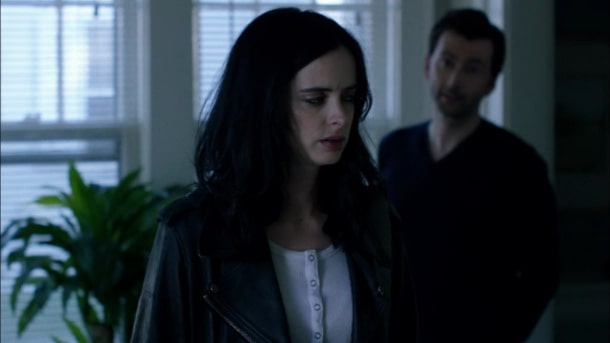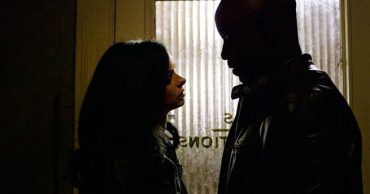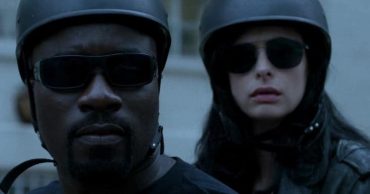
“AKA WWJD?” is like a mash-up of Homeland‘s “The Weekend” and the psychedelic trips shows like The Sopranos and BoJack Horseman have taken in the past, filling in the gaps of Jessica’s past, while giving voice to the motivations behind the monster that is Kilgrave. However, it’s neither as romantic or reflective as those aforementioned entries, an hour that pushes Jessica to finally confront her attacker in the Jessica Jones‘ best entry so far.
Removed from the normal rhythms of New York, “AKA WWJD?” isolates Jessica and Kilgrave from the rest of the show’s major players in the suburbs, giving the series plenty of room to breathe and explore their characters. Going back to Jessica’s childhood home serves two distinct purposes: depicting just how insane Kilgrave is, and giving voice to Jessica’s biggest emotional scar, the car accident that killed her entire family (and in the comic books, gave her powers), the first time in her life she felt she did something horribly irredeemable. As she fights to forgive herself for what she did to her family, and what Kilgrave forced her to do to Reva, Jessica does exactly what a true hero would do: she tries to help Kilgrave, to turn his lame excuses of a terrible childhood (in his defense, those experiments did look pretty unpleasant) into the prologue of the story of a man who changed the world.
But Kilgrave doesn’t want to use his powers for good; he doesn’t really even understand what the word “good” means, having been separated from the concept of empathy or desire through his life. It’s part of why he can’t comprehend the fact he raped Jessica (that and he’s an awful monster who tells people to cut people’s faces off): he’s never let anyone make a choice of their own since he scared his parents away. Kilgrave went from being a prisoner to being a man of influence (literally); smartly, however, “AKA WWJD?” stops trying to empathize with him there, with Jessica cutting him off and explaining what a ridiculous crock his attempts at appearing “human” would be. Plenty of people have bad childhoods and don’t become serial killers and rapists: Kilgrave is a true, unadulterated monster, and “AKA WWJD?” does a fantastic job in building that archetype out in three dimensions.
Jessica’s trip home isn’t just about expository nuggets of information, of course. Her scheme to entrap Kilgrave appears to go according to plan, recording plenty of evidence on Simpson’s phone before knocking her captor out and kidnapping him (her first attempt at flying, I might add – we haven’t seen the result of that massive leap just yet, however). “AKA WWJD?” is about Jessica taking the power back, for real. Even though her short-sighted plan to kidnap Kilgrave may work, what does she do with him now? He may be convicted for the crimes he committed while stalking her, but how long will that last? The solution feels temporary, and not just because of how quickly it plays out; knowing this is the eighth episode of the season, it certainly feels like there’s plenty more to happen between these two, which takes a bit of the tension out of Jessica’s bold move in the final moments of the hour.
Separating Jessica and Kilgrave from the main narrative, even if only for an hour, also reveals another flaw in Jessica Jones’ first season: outside of Trish, Malcolm, and the now-missing Luke Cage, Jessica Jones’ side characters are pretty lightweight. Do I care about Jeri’s divorce or Simpson’s fate? If I’m being honest, I couldn’t really care less about either. Besides “power lawyer lesbian” and “thick-headed, well-meaning blonde guy,” there isn’t much to run with in this hour otherwise dominated by the show’s most layered characters (and best performances, obviously). When Jessica Jones is not focused on Jessica, Luke, or what happened/is happening with Kilgrave, the show is a bit of a slog, even when Trish is around.
With such a strong central narrative – like the one on display in “AKA WWJD?” – this is mostly forgiven. There’s plenty to chew on with Jessica’s past and Kilgrave’s admissions, giving more color and depth to the imperfect hero and the enigmatic villain at the show’s core. And most importantly, it ends with a climatic sequence that’s an obvious boon to the dramatic momentum of the show moving forward, accelerating what’s been a pretty slow, saxophone-laced expedition through Hell’s Kitchen with an emotionally charged, thoroughly unsettling hour of Jessica slowing turning the tables (or so we hope) on Kilgrave. Now that Jessica Jones has finally dealt with the past and can look forward – with grit under its fingernails and blood in its eyes, of course – I can’t wait to see where it goes.
[Photo via Netflix]
 Follow Us
Follow Us





